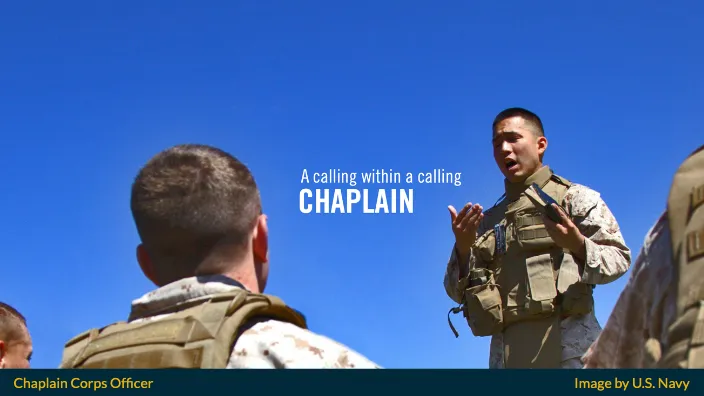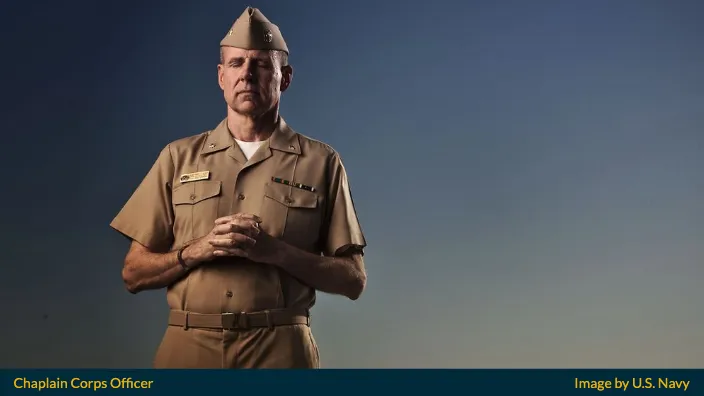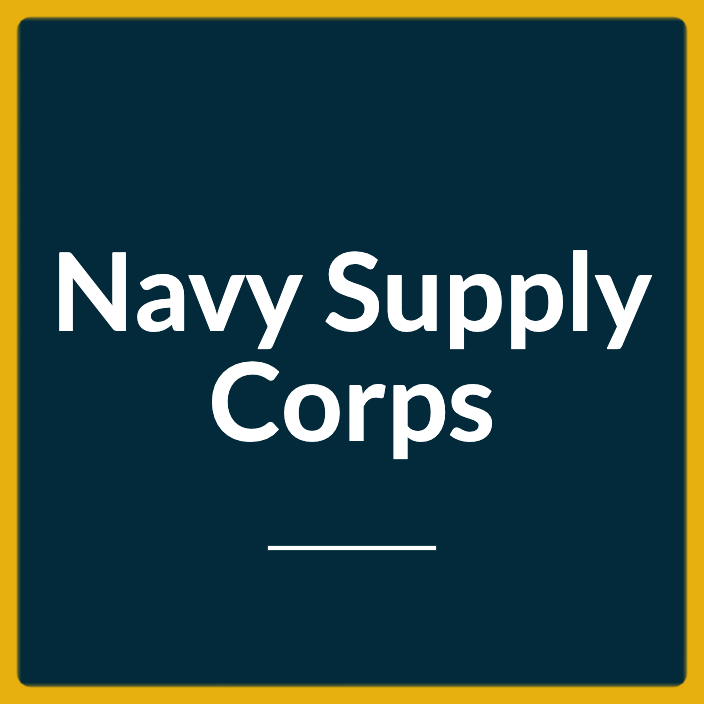Last Updated on October 14, 2024
This guide provides information that will help you with your decision to become a Navy Chaplain Corps Officer during Fiscal Year 2025.
Every day, the brave men and women of the Navy, Marine Corps, and Coast Guard answer the call to protect freedom worldwide. Navy chaplains play a key role by safeguarding the religious rights of these service members and their families.
There’s a lot to know about Navy chaplains, like their duties and the roles they take on.
So, let’s break it down!
Topics Covered
- What is a Navy Chaplain?
- Life of a Navy Chaplain
- How to Become a Navy Chaplain
- Navy Chaplain Career Progression
What is a Navy Chaplain?
A Navy Chaplain is a religious ministry professional and a Staff Corps Officer in the Navy who also works with the Marine Corps and Coast Guard. Their purpose is to offer guidance and comfort to their Sailors and Marines. The Navy Chaplain designator code is 4100.

Navy Chaplains are there to offer spiritual support to Sailors and Marines, helping them stay mentally strong and deal with the stress of life at sea.
Whether it’s handling long stretches away from home, the loss of a loved one, or other tough situations, chaplains provide a much-needed source of guidance.
Some chaplains focus on working with Sailors and Marines in a professional setting, while others connect on a more personal, spiritual level.
You’ll usually find Navy chaplains assigned to ships or shore bases, though some are stationed with the Marine Corps to support them too.
Responsibilities of a Navy Chaplain
As a Navy Chaplain, you’ll be the go-to person when service members need someone to talk to or lean on. Whether they’re facing personal struggles or trying to make big life decisions, you’ll be the trusted source of guidance.
You’ll often be the steady hand for young folks who are away from home for the first time, helping them navigate this new chapter of their lives.
A chaplain’s role is pretty diverse, working with people from all kinds of backgrounds and handling a wide range of responsibilities.
It entails supporting individuals from their most joyous to their most personally hard circumstances, and it might encompass any of the following responsibilities:
- Lead worship services in a variety of environments
- Perform religious rites and ceremonies such as weddings, funeral services, and baptisms
- Counsel individuals seeking guidance
- Manage religious education programs such as youth groups and Sunday school
- Visit hospitalized personnel and/or their family members and provide spiritual support and care
- Train lay leaders who direct religious programs
- Keep up with the latest issues and concerns that the Navy is facing
- Promote participation at religious services, conferences, and retreats, and conferences
- Advise leaders at all levels
Navy Chaplains are obligated to defend and protect everyone’s right to practice their faith.
As a result, you must be:
- Willing to operate in the military’s varied and pluralistic environment
- Tolerant of various religious traditions
- Respectful of others’ rights to decide their own personal convictions
Because of the specific setting of the military, Navy Chaplains must adopt these principles while maintaining the precepts of their own religious traditions.
It is also worth noting that Navy Chaplains are officially designated noncombatants and are not permitted to wield weapons.
Navy Chaplain Religions
The Navy has Chaplains from many different religions, including Christian, Buddhist, Jewish, Muslim, and many others.
Over 800 Navy Chaplains make up the Navy Chaplain Corps.
Chaplains confirm that more than 100 different religious groups (Christian, Jewish, Muslim, Buddhist, and many others) are now represented within the Navy.
Life of a Navy Chaplain
Some of the characteristics that distinguish Navy Chaplains’ work include:
- The ability to minister outside of a traditional church environment
- The opportunity to interact with people of other faiths
Every Navy Chaplain is also a Navy Officer, which means they take on a big leadership role too. They work together to make sure Sailors, Marines, and Coast Guardsmen have the freedom to practice their faith, but their reach goes way beyond just religion.
As a Navy Chaplain, you’re not just tending to spiritual needs—you’re living, working, eating, and praying alongside them, really getting to know what they’re going through. It’s a 24/7 kind of ministry where you’re always there for them.
You’ll offer everything from spiritual leadership to personal advice and comfort, using your own faith to lift others up and broaden your ministry’s impact.
All while adhering to the Chaplain Mission’s guiding principles, which are as follows:
- Providing religious care and assistance to members of your own faith
- Facilitating religious needs of people of all religions
- Caring for all servicemembers and their families, including those who have no religious affiliation
- Encouraging the command to safeguard religious freedom
Your calling could take you anywhere—whether it’s on land or out at sea.
You might lead religious services on a base, preach from the flight deck of an aircraft carrier, or even perform baptisms in the middle of the desert.
As a Navy Chaplain, your career could take you all over the world.
How to Become a Navy Chaplain

Navy Chaplain Requirements
Below are the basic eligibility requirements for the Navy Chaplain Corps program, current as of May 2019.
Citizenship
Applicants must be U.S. citizens. Dual citizens are eligible to apply but must renounce non-U.S. citizenship prior to final selection.
Age
Applicants must be commissioned by age 58. Those unable to complete 20 years of active commissioned service by age 62 must acknowledge in writing that they may not obtain retirement status.
Age waivers are considered on a case-by-case basis for applicants who exceed the age limit but possess skills critical to the Navy. Waivers must be approved prior to the Chaplain Appointment and Retention Eligibility Advisory Group (CARE-AG) meeting.
Education
Undergraduate Requirement
Chaplain Corps applicants must have a Bachelor’s degree from an accredited educational institution.
Graduate Requirements
Applicants must hold a graduate degree in theology or related subjects from an accredited educational institution.
A qualified degree program must include at least 72 semester hours (108 quarter hours) of graduate-level coursework.
Graduate courses in pastoral counseling, religious administration, social work, and similar disciplines may be considered related studies if one-half of the earned credits include topics in general religion, religious practice, religious philosophy, world religions, religious ethics, theology, and/or foundational writings from the applicant’s religious tradition.
Physical
In accordance with the Manual of the Medical Department, Chapter 15, applicants must be physically qualified and able to deploy with shore and sea-based operational units at any time.
Work Experience
Full-time religious leadership experience of at least two years is necessary.
Religious leadership experience must be commensurate with the responsibilities of a religious ministry professional in their particular religious organizations and applicable to military chaplaincy conditions.
Ecclesiastical Endorsement
Applicants must submit a Statement of Ecclesiastical Endorsement (DD Form 2088) directly from the authorized religious endorsing agent.
This form verifies that the individual is a Religious Ministry Professional (RMP) who is authorized to represent their religious organization and conduct religious observances.
Disciplinary Action
Applicants must disclose any adverse matters such as academic honor code violations, non-judicial punishments, civil or military court convictions, bankruptcy, or legal violations, including DUI/DWI incidents, which are disqualifying.
An admission to or conviction for an academic honor code violation, non-judicial punishment, misdemeanor or felony conviction in either civil or military court, a history of personal financial difficulties, or an excessive number of traffic or other legal violations are all disqualifying negative information.
Moral Character
As verified by inquiry and investigation, must be of strong moral character and unquestionable devotion to the United States.
No one who is alcohol or drug reliant, who presently abuses alcohol or drugs, whose pre-service abuse of alcohol or drugs suggests a predisposition to continue misuse in the military service, or who has a record of any trafficking charges may enter or be retained in the Navy Chaplain Corps.
Navy Chaplain Career Progression
Whether you are just starting out as a spiritual leader, want to extend your ministry, or want to take it in a different direction, the Navy is a terrific place to do so.
Active Duty Navy Chaplain
Thinking about going full-time as a Navy Chaplain?
On Active Duty, you’ll have tons of career and leadership opportunities to dive into. You’ll be able to make a real difference in the lives of people all over the globe.
Plus, you’ll get to enjoy all the perks that come with the job—and experience travel and adventure like never before.If you are accepted:
Your first training will last 12 weeks, beginning with five weeks at Officer Development School in Newport, RI, and ending with seven weeks at Naval Chaplain School at Fort Jackson, S.C.
Active Duty Chaplains often finish their training within three months of being commissioned.
Navy Chaplain School
The Navy Chaplaincy School (or Chaplain School) program consists of four weeks of basic school covering professional chaplaincy, working in a multicultural environment, chaplain corps history, ethics, ship visit, and religious ministry team training with a Religious Program Specialist.
Located in Newport, RI, Chaplain School also includes three weeks of Religious Ministry Team Exercise (RMTEX), a field exercise for religious ministry teams, Tools, Empowerment, and Ministry Skills (TEAMS), pre-marriage training, suicide prevention, and other activities.
The Chaplain School program gives you a mix of classroom learning and hands-on experience, helping you grow as a leader while sharpening your skills to provide religious ministry.
Whether you’re serving at sea, on base, or overseas, this training gets you ready to handle it all as a Navy Chaplain.
Post-Training
After finishing Chaplain School, you can keep learning throughout your career as a Navy Chaplain.
While serving full-time as a Navy Officer, you can take advantage of the Graduate Education Program, which offers more opportunities for advanced study.
Plus, you’ll have the chance to participate in clinical pastoral education and even get tuition support for other off-duty educational programs.
Graduate Student Navy Chaplain Candidate
Are you in the process of beginning or finishing your graduate theology degree?
If this is the case, you might consider enrolling as a student in the Navy Chaplain Candidate Program (CCPO).
You will be commissioned as a Navy Officer while completing your theology studies at a recognized seminary or graduate school through CCPO.
As part of the curriculum, you’ll also get on-the-job training directly supervised by a Navy Chaplain.
This is your chance to see Navy Chaplains in action and learn about the challenges and rewards of working in all the different environments the Navy has to offer.
You might head to the Fleet, observe chaplains on ships, or get hands-on experience at places like Walter Reed Military Medical Center or Naval Base San Diego.
Once you’ve completed the required steps, you’ll have an interview with your recruiter and the Chaplain Candidate Program Manager.
After that, a Selection Board at the Chief Chaplain’s Office will decide if you meet the standards to join the Navy Chaplain Corps.
Completing the Navy CCPO entitles you to considerable salary increases after you enter Active Duty.
Post-Service Opportunities
No matter your denomination, serving as a Navy Chaplain opens up almost every aspect of traditional ministry—and then some.
You’ll get opportunities that just wouldn’t come up in a typical civilian setting.
Your time as a Chaplain will give you unique experiences and a deep sense of fulfillment that you can carry with you into any future religious work.
The people you’ll meet, the lives you’ll impact, and the places you’ll travel to will stick with you forever.
More Information
If you want more information about becoming a Navy Chaplain Corps Officer, the next logical step is to contact a Naval Officer Recruiter.
Let us start figuring out how you can benefit from becoming a Chaplain Corps Officer – or if it is even a right fit for you.
You may also be interested to read these:
Hope you found this helpful as you plan your career.

